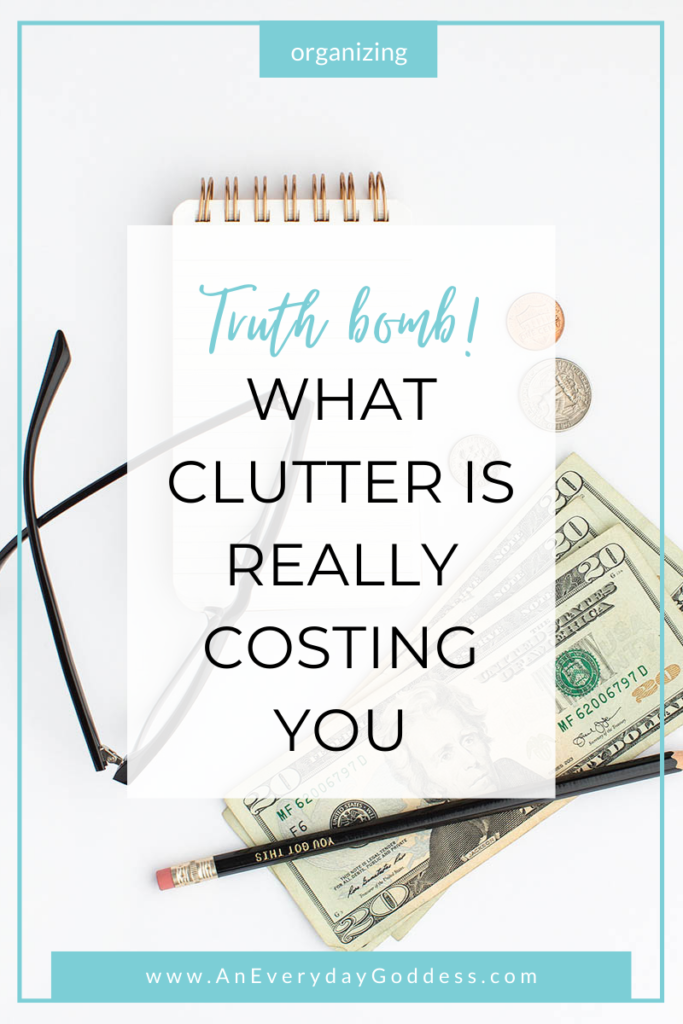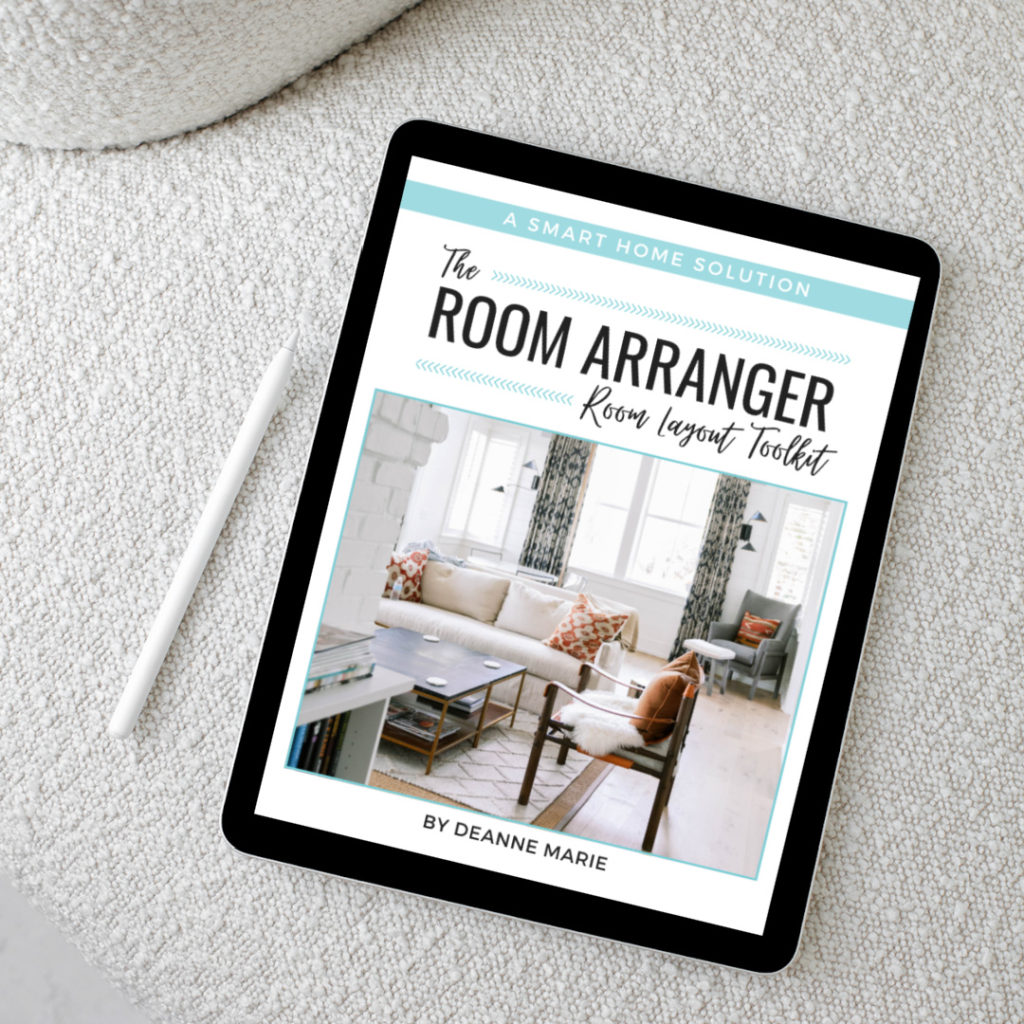
More than half of Americans admit they feel overwhelmed with clutter filling up their homes. And it turns out, all that clutter is costing us—a lot! If you need a little motivation to *finally* tackle that de-cluttering session you keep putting off, maybe these facts and stats will move you (scare you?) into action.
The reality is, your clutter is eating up your money, your time and your well-being, and could even be costing you valuable social and work connections. Time for some truth bombs, my friends! Here are six ways your clutter is robbing you.
1. Clutter Costs You Time
Think back to the last time you couldn’t find something, whether it was your keys, or a file on the computer. How much time did you spend searching? That time adds up. In fact, if time is money, then we spend a lot!
A study conducted by IKEA found that the average person will spend 5,000 hours in their lifetime looking for lost items. (5,000 hours!?!?!) Multiple that by the average hourly wage of $29.81 (according to the to the U.S. Bureau of Labor Statistics) and that’s $149,050 worth of our time!
2. Clutter Costs You Money
This might seem like an obvious one, but the myriad of ways that clutter costs us money is a bit alarming. How many of these situations can you relate to?
- Buying duplicates: According to a Pixie survey, we spend a total of $2.7 billion every year—with two thirds of us spending up to $50 yearly—to replace items we can’t find. (Personally, I think $50 seems low. That’s just a shirt or two and some office supplies.)
- Self storage fees: This is crazy, and I’m totally guilty of it. About 9 percent of U.S. households rent a self-storage unit for an average price of $89 for an average of 14 months. If you’re renting a storage unit, calculate your monthly cost over time and compare it to the value of the goods being stored, and decide: is it worth it?
- Buying bins: We spend a lot on corralling our clutter! The home organizing industry is worth $11.4 billion a year. (That’s us collectively trying to tame our stuff.)
- Paying late fees: Losing important documents and bills is a frequent result of paper clutter, and can lead to paying bills late. The average American household paid $119 in late fees in 2020, a total of $15 billion according to one study.
3. Clutter Eats Up Valuable Space
Whether you own or rent your space, you’re paying for every square foot of your abode. So, every square foot has value. How much of your space is dedicated to clutter? I don’t mean storing things you use, I mean, keeping things you aren’t using, forgot you had, or don’t know what to do with? Consider these stats:
- One in seven Americans have a room in their home they can’t use because it’s filled with things they don’t use. (This was definitely me after my mom died; my dining room was filled with her belongings that I hadn’t had time to go through.)
- A quarter of homeowners with a two-car garage don’t have room to park cars inside it, and 32% only have room for one vehicle. (And again my had would have gone up guiltily in the past.)
Apply this to your home. Take your mortgage or rent payment and divide it by the number of square feet in your place. Now multiply that by the approximate space being taken up by unused, unwanted, or unknown things. With inflation on the rise, the housing market tightening up, and people clamoring for more space, your clutter is literally throwing that money out the window.
Are you shocked yet? But we’re not done. Clutter affects us in important intangible ways, too.
4. Clutter Impacts Your Health and Well-being
Think about driving into your garage, or walking through the front door, or opening your closet. If the first thing you see is a pile of clutter, notice how you feel. Do you tense up? Feel overwhelmed? Stressed?
Polls show that about two-thirds of Americans have admitted that they feel stressed and anxious when their home is dirty or unorganized. And that impacts our mental, emotional and physical well-being in numerous ways. For example, stress releases cortisol, which puts you at a great risk for cardiovascular disease and cancer, not to mention your mental health! Our brains can’t rest when confronted by constant mess, which leads to fatigue and feeling down.
5. Clutter Robs You of Social Connection
If you won’t have friends and family to your home because you’re embarrassed by the clutter, or you can’t have people over because there’s literally no clear space to sit, you’re missing out on vital social connections. And, you’re not alone. About 12 percent of Americans admit that when they have guests, they worry about how cluttered their home looks.
6. Clutter Can Affect Your Work
Clutter can affect your job. Nearly 1 in 9 women have admitted to being late to work because they misplaced their keys or other necessary items. Being late doesn’t just affect you and your focus. Studies show that chronic tardiness leads to decreased productivity and morale in the office. It can even show up on performance evaluations, which could affect your pay or promotion opportunities.
But that’s not all. In another study, work colleagues deemed the owner of a messy workspace to “be less agreeable, neurotic, and ‘careless, cranky and uncaring.’” Ouch! If that’s not how you want to come across to your workmates as you return to an office environment, take some time to clean up your workspace. (My tips in this free download can help, and then check out this post for my desk de-cluttering process.)
How does clutter affect you?
This is a lot to take in, I know. Take a moment to consider which “cost” resonates the most with you. Then dig a little deeper into why it resonates. Come up with one action step you can take to resolve clutter in that area of your home or life. And commit to doing just that one thing. Then do another. Let the clutter clearing momentum build, and you will be on your way to a more relaxing and comfortable home.
If you enjoyed this content, may I ask a favor? Please leave me a comment with your biggest takeaway, and then share this article using the button below for your fave social channel. Thanks!


 Hi! I’m Deanne Marie – designer, author, attorney, travel enthusiast and everyday goddess. I love showing other single professional women how to create a home that is as comfortable as it is stylish, and have joy-filled, everyday goddess kind of life.
Hi! I’m Deanne Marie – designer, author, attorney, travel enthusiast and everyday goddess. I love showing other single professional women how to create a home that is as comfortable as it is stylish, and have joy-filled, everyday goddess kind of life.
